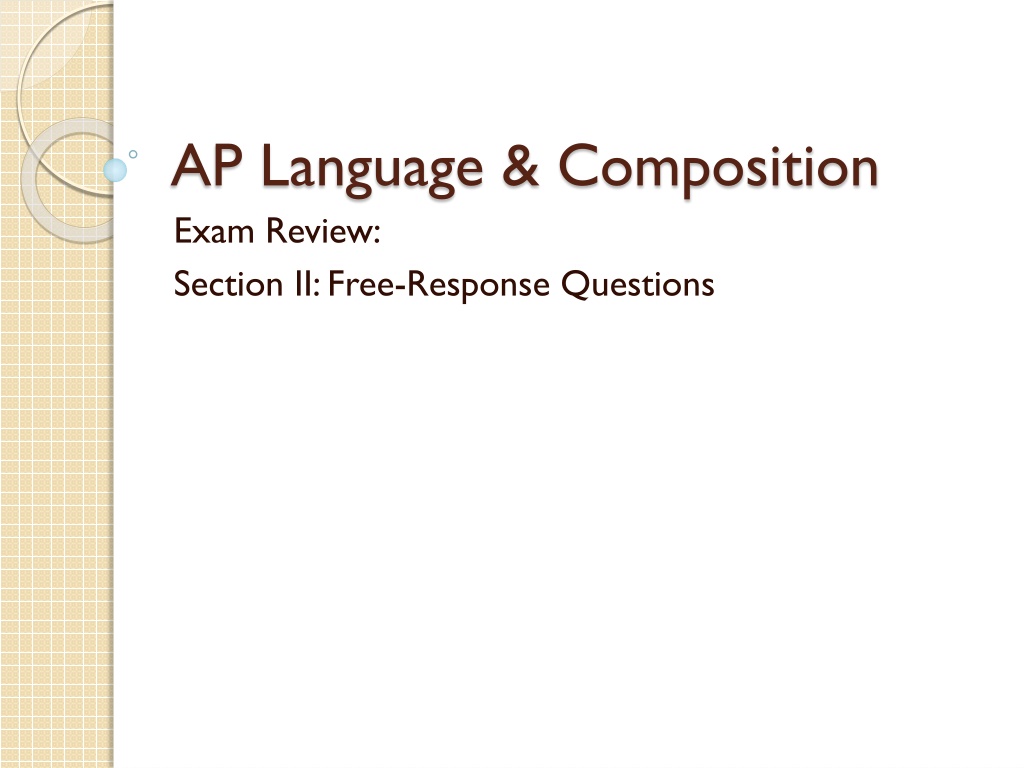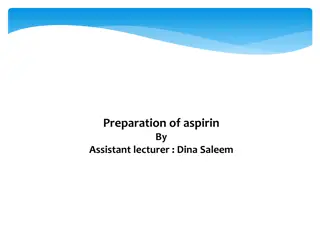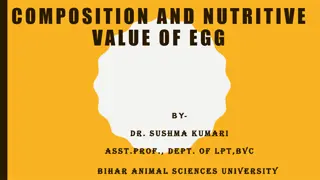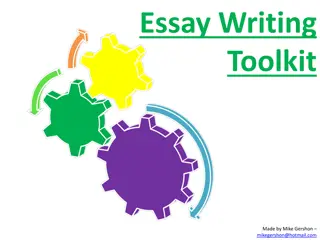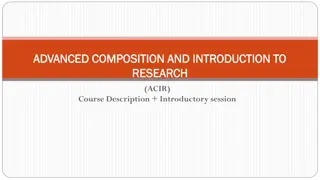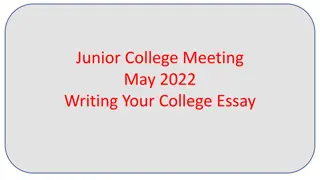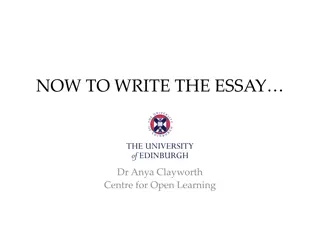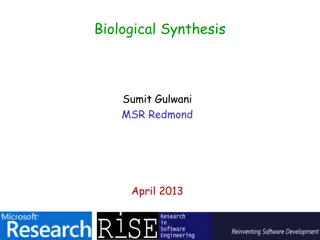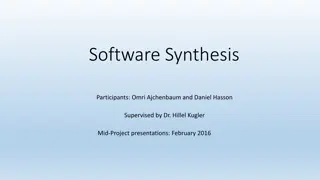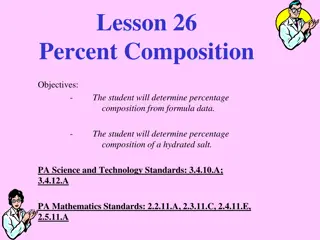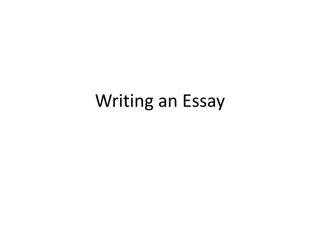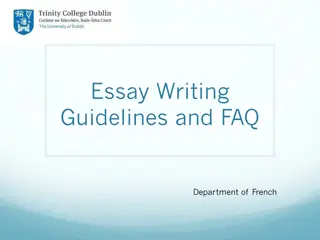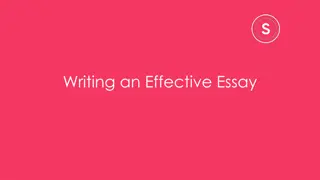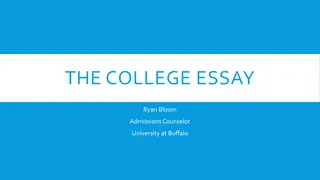Effective Strategies for AP Language & Composition Synthesis Essay
Enhance your AP Language & Composition Synthesis Essay scores with tips like focusing on original arguments, considering multiple perspectives, incorporating additional knowledge, avoiding simplistic responses, and using multiple pieces of evidence.
Download Presentation

Please find below an Image/Link to download the presentation.
The content on the website is provided AS IS for your information and personal use only. It may not be sold, licensed, or shared on other websites without obtaining consent from the author. Download presentation by click this link. If you encounter any issues during the download, it is possible that the publisher has removed the file from their server.
E N D
Presentation Transcript
AP Language & Composition Exam Review: Section II: Free-Response Questions
Question 1: Synthesis Read the prompt carefully to identify the task that they are asking you to complete. Your argument should be the focus of the essay (it says that in the directions) Do not summarize the sources or merely use the argument presented in the introduction to the question Use at least 3 sources. You may use personal knowledge/experience as proof in your argument in this essay.
Synthesis: Tips for a Higher Score Don t format the essay like this: Body 1-AA Body 2-CC Body 3-EE Instead-Body 1-AC Body 2-ED Body 3- ABD
Synthesis: Tips for a Higher Score Make sure there is something fresh about your argument. Although it is very important to weave the sources into your argument to strengthen and inform it, your argument should also transcend the sources. It needs originality.
Synthesis: Tips for a Higher Score Don t just agree or disagree. That is too simplistic. Show your ability to consider both sides of the issue. Do this by either addressing and refuting opposition or qualifying your own argument with a well-thought-out concession.
Synthesis: Tips for a Higher Score Show depth of knowledge by adding proof to your argument that does not appear in the sources (when and if possible). The highest scoring essays nearly always have a comment about the student showing additional knowledge. Just be sure that the proof you add that is not source-based is actually true and valid. No making it up in this essay!
Synthesis: Tips for a Higher Score Quantity: Don t use one piece of evidence to support one of your claims. If you can t incorporate more than one piece of proof, then you should throw out that claim/point. One citation is not enough. In fact, two is a minimal number. Use more than two if and when possible.
Ex: 2012 Prompt Children are some of the most highly sought consumers in the world; therefore, marketers continue to compete for the money children spend and for the influence they have on their parents spending. Some organizations, including child advocacy groups, have expressed concern about the ethics of marketing to children. However, others believe that some types of marketing can have a positive influence on children. Carefully read the following six sources, including the introductory information for each source. Then synthesize material from at least three of the sources and incorporate it into a coherent, well-written essay that develops a position on the ethics of marketing goods and services to children. Your argument should be the focus of your essay. Use the sources to develop your argument and explain the reasoning for it. Avoid merely summarizing the sources.
Question 2: Rhetorical Analysis Read the question, passage, and identify the writer s purpose or claim immediately. Identify the rhetorical devices/strategies that HELP SUPPORT OR ADVANCE THE PURPOSE. The most important aspect of this essay is your purpose. Remember: Most students will be able to identify devices, but it is in the explanation of how they contribute to the claim that you earn your points. Use at least 2 textual examples for each point.
Question 2: Rhetorical Analysis 4 Steps to Success on this Essay 1: Identify the device in the text 2: Explain how the text cited is being utilized as or is that particular device or strategy. (DO NOT DEFINE THE TERM) 3. Explain the intended affect on the readers/listeners. Showing knowledge of the actual audience also earns big points here. 4. Explain how the use of said device contributes to the speaker or writer s purpose. Be specific here in how this works. **This is how you get an 8 or a 9. Without this, the chances are slim.
Question 2: Rhetorical Analysis AVOID: Using I or incorporating your own opinion whatsoever Defining the devices for the readers Choosing devices that do not advance the purpose merely because you identify them. Mislabeling the speaker/writer or speech/essay. Read the information at the top! Saying this supports the author s purpose without saying how or what said purpose is! Repetitive phrasing in the purpose: The effect of this strategy is or this contributes to the author s purpose because. Vary your phrasing to show your vocabulary skills.
Ex: Rhetorical Analysis On April 10, 1962, as the United States was emerging from a recession, the nation s largest steel companies raised steel prices by 3.5 percent. President John F. Kennedy, who had repeatedly called for stable prices and wages as part of a program of national sacrifice during a period of economic distress, held a news conference on April 11, 1962, which he opened with the following commentary regarding the hike in steel prices. Read Kennedy s remarks carefully. Then write an essay in which you analyze the rhetorical strategies President Kennedy uses to achieve his purpose. Support your analysis with specific references to the text.
Question 3: Argumentative Essay Read the prompt and establish a very clear position in the introduction The most important aspect of this essay is your proof. Creativity and diversity of proof is key to your getting a high score Be sure that your purpose after each piece of evidence explains/relates back to your position. Don t assume the reader knows your reference and/or how you see it being related to your position.
Question 3: Argumentative Essay Proof/Evidence Categories to Choose From: -History -Science -Psychology -Math -Pop culture/Current events -Literature -Movies -Government -Personal experience -Observations of others -Make it up!
Question 3: Argumentative Essay There are two ways to format this essay: 3 or 4 very well-developed examples from diverse areas. Try to avoid similar categories: i.e. a personal experience that is identical to an observation of someone else s experience Examples that are not explained as deeply but are many in number and are organized by category. For example, one paragraph about scientific research/finding, another containing 5 or 6 celebrity examples, another with multiple personal experiences and observations
Argumentative: Tips to a Higher Score Add a refutation paragraph that has examples that help you to argue against opposing views **Big points over an essay with all supporting examples Creative use or application of examples from atypical areas (science/math/psychology, etc.) Clear purpose explaining how your proof supports position Put one of your examples in the introduction as your attention getter. Usually, the atypical examples create metaphorical or analogical ties to the issue being discussed. This also works when you come up with an example that is difficult to organize with other proof in a paragraph.
Ex: Argumentative Essay Consider the distinct perspectives expressed in the following statements: If you develop the absolute sense of certainty that powerful beliefs provide, then you can get yourself to accomplish virtually anything, including those things that other people are certain are impossible. William Lyon Phelps, American educator, journalist, and professor (1865-1943) I think we ought always to entertain our opinions with some measure of doubt. I shouldn t wish people dogmatically to believe any philosophy, not even mine. Bertrand Russell, British author, mathematician, and philosopher (1872-1970) In a well-organized essay, take a position on the relationship between certainty and doubt. Support your argument with appropriate evidence and examples.
Ex: Argumentative Essay Consider the following quotation from The American Scholar, a speech given by philosopher and writer Ralph Waldo Emerson (1803-1882) in 1837. Books are the best of things, well used; abused, among the worst. In a well-organized essay, examine the extent to which Emerson s assertion about the power of books is true or relevant today. Support your argument with appropriate examples from your reading, observations, or experience.
All Essays Introduction is key A strong attention getter immediately sets the tone for the rest of the essay and sets you apart from the hundreds of other essays the reader must read. Elevated vocabulary sprinkled throughout earns a higher score. Avoid clich s and basic word choices: good, bad, a lot, etc. If you get done early, go back and finesse your conclusions and/or intros.
